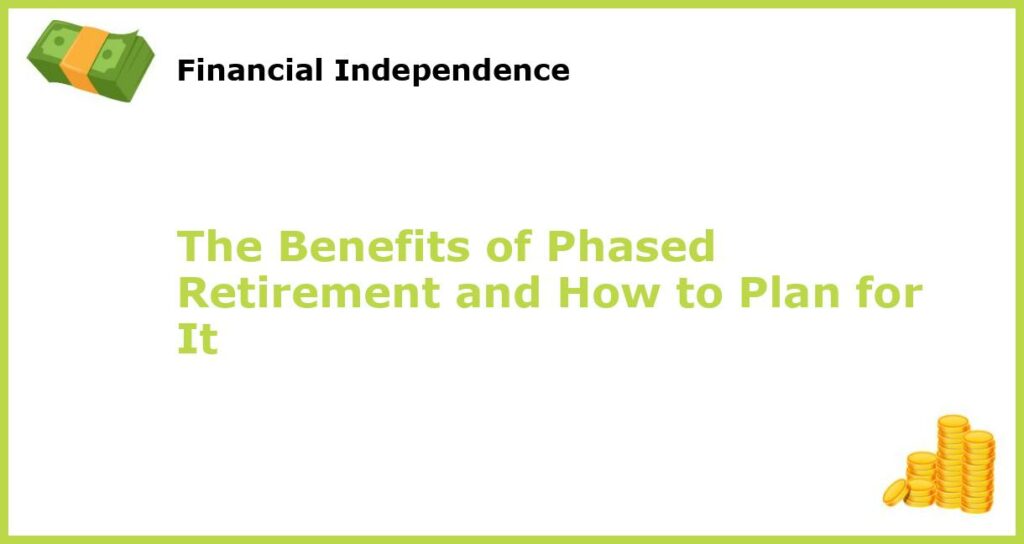If you’re nearing retirement age, you might be wondering if a phased retirement is right for you. This is an option where you can gradually decrease your workload before you retire completely. This can be a nice way to ease out of your career and into retirement in a stress-free and gradual way that can also benefit your employer. There are numerous benefits of phased retirement, such as flexibility, reduced stress, the ability to retain knowledge and expertise, financial benefits, and even health benefits. In this article, we’ll take a closer look at these benefits of phased retirement and provide a guide on how to plan for it.
Flexibility and Reduced Stress

One of the most significant benefits of phased retirement is that it offers flexibility and reduced stress to employees. Since the decrease in working hours is gradual, this can give you more control over your schedule and allow you to lead a more balanced life before you retire completely. You’ll still be working, but also have the time to devote to other activities, whether that’s travel, hobbies, or spending time with family and friends. A reduced workload can also reduce the amount of daily stress and work-related burnout you experience.
Retain Knowledge and Expertise

When you gradually decrease your workload, it allows your employer to retain your knowledge and expertise. You can act as a mentor to younger employees and ensure that they are prepared to take over your responsibilities when you retire. This is an excellent way to pass on valuable information that you’ve accumulated during your career to the next generation of workers. As you decrease your workload, you’ll have more time to focus on training your colleagues and preparing them for your eventual retirement.
Financial Benefits

Another benefit of phased retirement is financial. It provides an opportunity to supplement your retirement savings while continuing to work. Your reduced workload can still provide you with a paycheck, which can be beneficial in planning for retirement. Since it’s less expensive for companies to retain experienced employees rather than hiring and training new ones, they can also benefit financially from phased retirement. This can result in cost savings for the company and less stress for you.
Health Benefits

Reducing your working hours through phased retirement can also lead to health benefits. Work-related stress can take its toll on your physical and mental health, so a reduced workload can help to alleviate the symptoms that stress can cause. This might mean that you experience increased energy, better mental clarity, and even better sleep. It’s also an opportunity to focus on other health-related activities, such as exercise and healthy eating habits.
Planning for Phased Retirement

Planning for phased retirement involves taking several factors into account. You’ll need to discuss options with your employer, calculate your retirement savings and expenses, create a transition plan, and consider the legal and financial implications of phased retirement.
Discuss Options with Employer

The first step in planning for phased retirement is to discuss your options with your employer. Some companies might offer phased retirement options, while others might not. Be prepared to negotiate a reduced work schedule or part-time work if that’s what you’re interested in. It’s important to communicate your goals with your employer well in advance of your planned retirement date.
Calculate Retirement Savings and Expenses
Before making any decisions about phased retirement, you’ll need to calculate your retirement savings and expenses. This will help you determine how much money you’ll need to supplement your savings during the phased retirement period.
Create a Transition Plan
Creating a transition plan for the phased retirement period can help you adjust to your reduced workload and ensure a smooth transition into retirement. You might want to consider identifying new hobbies or activities that interest you so that you have something to look forward to during your free time. Additionally, you might want to explore new roles within the company that differ from your current duties but still provide valuable experience and knowledge.
Consider Legal and Financial Implications
Phased retirement has legal and financial implications that you’ll want to consider. You’ll need to review your retirement accounts and estate plans, as well as understand how phased retirement can impact Social Security benefits. Consulting with a financial advisor can be helpful in navigating these legal and financial complexities.
Consult with a Financial Advisor
Finally, consulting with a financial advisor can provide guidance on retirement savings and expenses, investment strategies, and navigating the legal and financial complexities of phased retirement. They can help ensure that you have a solid plan in place so that you can enjoy a stress-free retirement.







